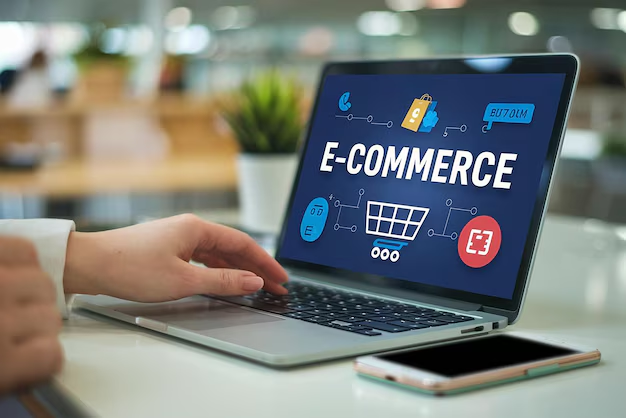In today’s fast-changing digital world, starting an e-commerce business is a great way to make money and be financially free. It’s easy to start with little money and reach people all over the world. But, with so many others doing the same, it’s important to be smart and focused.
By picking a profitable niche, using your special skills, and building a strong brand, you can succeed. Learning new marketing and sales tricks and having different ways to make money are also key. Plus, using your profits wisely and staying determined will help your online business grow and make a lot of money.
Key Takeaways:
- The e-commerce market is set to grow a lot, reaching $6 trillion by 2024.
- Even though there are over 26 million active sites, most (80-90%) fail in the first 120 days. This shows the importance of a smart plan.
- Using personal branding and social media can help you be noticed in the busy online world.
- Having different ways to make money, like affiliate marketing and subscriptions, can give you steady, easy income.
- Always keep learning and putting money back into your e-commerce business to keep growing and succeeding.
Understanding the E-commerce Business Landscape
The e-commerce world has grown a lot in recent years. By 2027, it’s expected to hit over $8 trillion, up 39% from now. This growth opens doors for entrepreneurs and businesses looking to go online.
The Rise of E-commerce and Its Opportunities
In 2023, e-commerce made up over 19% of all retail sales globally. By 2027, it’s set to reach nearly a quarter. Online shopping is popular because of its ease, wide range of products, and global reach. Starting an online business can be flexible and independent.
Challenges of Starting an E-commerce Business
Starting an e-commerce business comes with its own set of challenges. The market is crowded, so finding a niche is key. You need to create engaging content, list products individually, and negotiate with suppliers. Turning potential buyers into loyal customers is also crucial.
Before you start, you must lay a solid foundation. This includes getting a domain name, finding a web developer, and setting up legal and payment systems. A good start is essential for success.
| Ecommerce Business Models | Description |
|---|---|
| B2C (Business-to-Consumer) | Businesses selling products or services directly to consumers. |
| B2B (Business-to-Business) | Businesses selling products or services to other businesses. |
| C2C (Consumer-to-Consumer) | Individuals selling products or services to other individuals. |
| DTC (Direct-to-Consumer) | Businesses selling products or services directly to consumers, bypassing traditional retail channels. |
| C2B (Consumer-to-Business) | Individuals selling their products or services to businesses. |
| B2G (Business-to-Government) | Businesses selling products or services to government entities. |
| C2G (Consumer-to-Government) | Individuals selling their products or services to government entities. |
The e-commerce world offers many business models, each with its own opportunities and challenges. Knowing these models helps entrepreneurs choose the best fit for their business idea.
Finding a Profitable Niche for Your E-commerce Business

Finding a profitable niche is crucial for a successful e-commerce business. By focusing on a specific market, you can tailor your product or service and marketing. This makes you an expert and sets you apart from others.
Choose a niche that matches your passions and skills. Think about what problems you can solve for your customers. Look at the e-commerce world to find markets with demand but little competition. Study trends and competitors to see if a niche is profitable.
It’s also key to make sure your niche fits with the licenses and permits needed for your e-commerce business. Create a detailed business plan that covers all legal needs. This ensures a smooth start and keeps you in compliance.
| Profitable Niche Examples | Key Insights |
|---|---|
| Health and Wellness | The health and wellness niche is growing as people focus on their health. There are opportunities in organic products, fitness gear, and nutrition. |
| Pet Supplies | Pet owners are spending more on their pets than ever. Look into organic food, premium accessories, and special services. |
| Digital Products | Digital products like eBooks and software are popular. They have the advantage of no inventory or shipping costs. |
| Eco-friendly Products | With more people caring about the environment, eco-friendly products are in demand. Look into sustainable fashion, natural home goods, and renewable energy accessories. |
By picking a profitable niche and meeting legal needs, you can start a thriving e-commerce business. This business will stand out in the online world.
“The key to building wealth with an online business is finding a profitable niche where there is demand but not too much competition.”
Building a Strong Online Presence

In today’s world, having a strong online presence is key for e-commerce success. Your online presence is the base for attracting, engaging, and converting customers. At its core is building a strong personal brand and using social media marketing wisely.
Developing a Personal Brand
Your personal brand makes you stand out and connects you with your audience. A unique brand identity shows your expertise, values, and what makes your e-commerce business special. Use visual content like professional photos and brand graphics to make your online presence appealing and consistent.
Leveraging Social Media Marketing
Social media is a key tool for digital marketing in e-commerce. It helps you market your e-commerce business, drive website traffic, and reach more people. Try out different platforms like Instagram, Facebook, and LinkedIn to find where your customers are most active. Share engaging content, work with influencers or affiliate partners, and use email marketing to grow a loyal customer base and sell products or services directly (C2B).
Focus on your personal brand and smart social media use to build a strong online presence for your e-commerce business. Keep checking data and tweaking your plans to keep your online presence effective and appealing to your audience.
Mastering E-commerce Marketing and Sales Strategies

In the fast-changing world of e-commerce, marketing and sales are key to success. Good marketing campaigns and optimized sales funnels can make all the difference. They can turn a struggling online business into a thriving one.
Effective Marketing Campaigns
Creating marketing campaigns that meet your customers’ needs is crucial. Use a mix of digital marketing like SEO, social media ads, and influencer partnerships. This helps you reach your audience effectively.
- Improve your website’s search visibility with SEO. This makes it easier for people to find your products or services.
- Use targeted social media advertising to reach specific groups. This drives traffic and engagement to your site.
- Work with relevant influencers to showcase your products. This can attract their loyal followers in a genuine way.
Optimizing Sales Funnels
Improving your sales funnels can boost your e-commerce business. Use email marketing, webinars, and lead magnets to guide potential customers. This helps them through the buying process.
- Build a strong email marketing strategy. Send personalized emails, offers, and newsletters to keep in touch with customers.
- Use webinars and live videos to build trust. Show your expertise and provide valuable content to your audience.
- Offer lead magnets like guides or free trials. This captures customer info and engages them with your brand.
By mastering e-commerce marketing and improving your sales funnels, you can unlock your online business’s full potential. This drives sustainable growth in the competitive e-commerce market.
| Strategy | Impact | Key Benefits |
|---|---|---|
| SEO | Improved search visibility | Increased organic traffic, higher conversion rates |
| Social Media Advertising | Targeted audience reach | Precise targeting, enhanced brand awareness, and lead generation |
| Influencer Collaborations | Leveraging trusted voices | Increased credibility, trust, and exposure to new audiences |
| Email Marketing | Nurturing customer relationships | Personalized communication, repeat business, and higher lifetime value |
| Webinars and Lead Magnets | Building authority and capturing leads | Establishing expertise, generating qualified leads, and driving conversions |
Diversifying Your Revenue Streams in an E-commerce Business

Running a successful e-commerce business is more than just selling products. It’s about creating many ways to make money. Smart business owners know that relying on one income source is too risky. So, they work on making different ways to earn money in their online stores.
One smart move is to sell more than one type of product. Amazon is a great example. They started as an online bookstore but now sell everything from electronics to household items. This way, they make money from many sources and don’t rely on just one.
Shopify also has found ways to make more money. They offer services like payment processing and shipping solutions, not just their main platform. This has helped them grow their income and stay a top player in e-commerce.
Another good idea is to sell affiliate products. By working with other brands and promoting their items, you can earn money without having to handle the products. This is a smart way to make money without extra work or costs.
E-commerce businesses can also make money from passive income streams like ad revenue or sponsored content. By using ads on your website or social media, you can earn more money without selling anything directly.
| Revenue Stream | Examples | Potential Benefits |
|---|---|---|
| Expanding Product Offerings | Amazon, Shopify | Reduced dependence on single product lines, increased revenue potential |
| Affiliate Products | Commission-based partnerships | Passive income, expanded product selection without inventory management |
| Passive Income Streams | Ad revenue, sponsored content | Additional revenue without directly selling products, monetizing website or social media channels |
By having many ways to make money, your e-commerce business can be stronger and more stable. As your business grows, keep looking for new ways to make more money. This will help you stay ahead in the competitive world of e-commerce.
“Diversifying revenue streams is a key strategy for growing and sustaining a successful e-commerce business over time.”
E-commerce Business Growth and Reinvestment

Building a thriving e-commerce business is not just about initial success. It’s about growing and developing over time. After you’ve made a profit, it’s key to put some of that money back into your business. This can mean upgrading your website, running targeted ads, or growing your team.
Scaling Your E-commerce Business
As your e-commerce business grows, scaling is crucial. This means making your operations better, improving customer service, and adding more products. Using real-time data helps you make smart choices that balance growth and profit.
Keeping a good cash conversion cycle (CCC) is important. A CCC of 3-4 days is best for most DTC brands. It helps manage inventory and keep cash flowing well.
Continuous Learning and Development
In the fast-changing world of e-commerce, staying ahead means always learning and growing. Investing in your skills through courses and mentors can open up new opportunities. It also helps you improve your business plans.
By putting your profits back into your business and always learning, you set it up for long-term success. Remember, scalability and capital efficiency are vital for a successful online business. Diversifying your investments can also boost your growth.
“Reinvesting in your e-commerce business is the key to unlocking sustainable growth and long-term success. Continuous learning and strategic scaling are essential for staying ahead of the competition.”
Also Read : Top Online Freelancing Opportunities To Boost Your Income
Conclusion
In 2024, the e-commerce world is full of chances for entrepreneurs to make money online. They can succeed by understanding the market’s changes. This includes mobile shopping, new technologies, and digital platforms reaching more people.
To do well in e-commerce in 2024, find a profitable niche and build a strong brand. Learn how to market and sell well. Also, find different ways to make money and keep growing your business and skills.
The internet’s power can help entrepreneurs make money and achieve freedom. As the global e-commerce market grows, reaching $4.9 trillion by 2021, there are more chances than ever. With the right plan, hard work, and flexibility, e-commerce can lead to success in 2024 and beyond.
FAQs
Q: What is the cost to start an e-commerce business?
A: The cost to start an e-commerce business can vary widely depending on factors such as the e-commerce platform you choose, inventory costs, and marketing expenses. On average, you might spend anywhere from a few hundred to several thousand dollars to set up your business.
Q: How much does it cost to create an e-commerce website?
A: The cost to create an e-commerce website can range from $0 if you use free website builders, to $5,000 or more for a custom-built site. This includes expenses for domain registration, hosting, and any additional features or plugins you may want to implement.
Q: What are some tips for starting a successful e-commerce business?
A: Some tips for starting a successful e-commerce business include conducting thorough market research, developing a clear business plan, choosing the right e-commerce platform, and focusing on effective marketing strategies to reach your target audience editorial team step-by-step guide get your products also include employer identification number individual customers many e-commerce.
Q: What is a good e-commerce business idea for beginners?
A: A good e-commerce business idea for beginners is dropshipping, as it allows you to sell products without holding inventory. You can also consider niche products, handmade items, or digital products to reduce overhead costs.
Q: How can I set up my e-commerce business effectively?
A: To set up your e-commerce business effectively, follow these steps: choose a business name, register your business, create a business plan, select an e-commerce website builder, and outline your fulfillment and shipping strategy.
Q: What are the steps to start an e-commerce store?
A: The steps to start an e-commerce store include: identifying your niche, writing a business plan, choosing an e-commerce platform, creating a website, sourcing products, setting up payment methods, and developing a marketing strategy.
Q: How do I market my e-commerce website?
A: To market your e-commerce website, utilize various strategies such as SEO, social media marketing, email marketing, content marketing, and paid advertisements. It’s important to track your analytics to understand what works best for your audience.
Q: What is fulfillment and why is it important for e-commerce?
A: Fulfillment refers to the process of receiving, processing, and delivering orders to customers. It is important for e-commerce because efficient fulfillment can enhance customer satisfaction and streamline your shipping strategy, leading to the success of your business.
Q: Should I create a privacy policy for my e-commerce website?
A: Yes, it’s also a good idea to create a privacy policy for your e-commerce website. This policy informs your customers about how you collect, use, and protect their personal information, which is essential for building trust and ensuring compliance with legal requirements.
